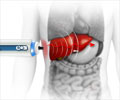Type 2 diabetes patients with non-alcoholic fatty liver disease (NAFLD) are at an increased risk of developing diabetes-related chronic kidney disease (CKD), says a new study.
A new study says that patients who are diabetic and suffer from non-alcoholic fatty liver disease (NAFLD) are at an increased risk of developing diabetes-related chronic kidney disease (CKD).
NAFLD is an increasingly common type of chronic liver disease, in which deposits of fat build up in the liver.The study was conducted over 1,760 Italian adult patients with type 2 diabetes. Out of this, 547 patients over the period of six and a half years, developed CKD.
The study excluded patients with other common causes of fatty liver, such as alcohol abuse, chronic viral hepatitis and use of medications with potentially toxic effects on the liver.
"Identifying patients with NAFLD would highlight a subgroup of type 2 diabetic individuals who should be targeted with more intensive therapy to decrease their risk of developing CKD," said lead authors Dr. Giovanni Targher of University of Verona in Verona, Italy and Dr. Michel Chonchol of University of Colorado Health Sciences Centre in Denver, Colorado.
Diabetic patients with NAFLD had 69 pct increased risk of developing CKD than patients without NAFLD.
The difference remained significant after adjusting a wide range of other potential risk factors, including age and sex, body fatness, duration of diabetes, glycemic control, hypertension, smoking and medications for hypertension, diabetes or dyslipidemia.
Advertisement
"Instead, NAFLD may be actively involved in the pathogenesis of CKD in type 2 diabetes, possibly through the release of some pathogenic factors from the liver," said Drs. Targher and Chonchol.Diabetes related kidney disease or diabetic nephropathy could lead to permanent loss of kidney function requiring dialysis or transplantation.
Advertisement
Researchers believe that intensive treatment might help in preventing or delaying development of CKD in these patients.
However, further study is needed to determine whether fatty liver is linked to an increased risk of CKD in patients without diabetes.
The study will appear in the August Journal of the American Society of Nephrology (JASN).
Source-ANI
RAS/L











